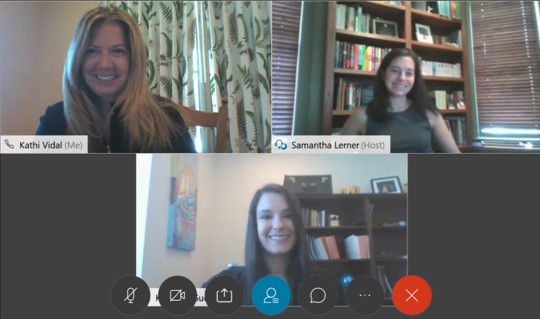How to Thrive as a Junior Attorney: Lessons Learned from a Conversation with Danielle Coleman, VMware; Kevin Hamel, SAP; and Mary Huser, Airbnb.
On October 22, 2020, ChIPs Next Generation Lawyers and the Berkeley Center for Law & Technology presented an in-house panel discussion on creating and encouraging client-facing opportunities for junior attorneys.
In-house counsels Danielle Coleman (Senior Litigation Counsel, VMware), Kevin Hamel (Head of Global Litigation, SAP), and Mary Huser (Deputy Counsel, Risk and Regulatory, Airbnb) offered insights on their career paths, their perspective on skills required to effectively serve a client or be an in-house counsel, and their initiatives to provide client-facing opportunities for junior attorneys.
The panel was moderated by two litigation associates at Winston & Strawn: Yarden Kakon, Co-Chair of the Next Gen Junior Committee, ChIPs member and co-founder and President of Women in Tech Law and Dillon Kellerman, Co-Chair of the Next Gen Junior Committee.
Prefatory and closing comments were provided by Kathi Vidal, managing partner of Winston & Strawn’s Silicon Valley office and founder of the ChIPs Next Gen effort, and DaWanna McCray, Winston & Strawn litigation associate, Co-Chair of the Next Gen Junior Committee, and former clerk for Judge Tanya Walton Pratt (SDIND).
This post will review lessons learned from this engaged discussion. You can view the full discussion here.
Topic 1: Path to In-House
Lesson #1: Be open to opportunities.
“No one’s path to in-house is perfect. Be open to ideas and suggestions and you can always go back if you do not like what you are doing” Mary Huser, Airbnb.
Indeed, all three panelists took different and distinct paths to in-house positions. What the panelists all had in common, however, was that they each worked in a law firm before transitioning into an in-house position. In fact, all three panelists agreed that, while it is not impossible for a junior attorney to go directly in-house and be successful, it is beneficial, if not recommended, for a junior attorney to acquire training and development at a law firm before transitioning in-house. As they explained, this is due to the fact that law firms have facilities and systems in place specifically to train and develop skills of junior attorneys that many in-house positions do not have.
Topic 2: Guidance to Junior Attorneys
The panelists then transitioned to advising junior attorneys on how to succeed and attain substantive opportunities.
Lesson #2: Be a service provider.
“Every Lawyer in every firm is an independent contractor and if you are not looking at it this way, then you are doing a disservice to your career. You are only as good as the latest work [you have done] for a partner. Treat finding work as a business opportunity.” Kevin Hamel, SAP.
Lesson #3: Develop yourself as someone people want to work with.
“It’s all about relationships.” Danielle Coleman, VMware.
All three panelists agreed that being able to effectively communicate is vital for a junior attorney, regardless of whether a colleague may have a difficult or easy personality. To the panelists, this also meant being a team player and demonstrating your ability to effectively work with others and also have fun.
Danielle Coleman expressed that learning how to work on and communicate with teams was one of the many important skills she learned working in a big law firm that helped her succeed in-house. On the same note, Danielle Coleman shared that learning to ask for help and “delegating joy” is another skill that junior attorneys should implement while working with others.
When asks to provide advise attorneys on how to continue their development during the COVID-19 pandemic, Danielle Coleman shared that success is contingent on PIE – Performance (10%), Image (30%), and Exposure (60%). Given the social impediments created by the COVID-19 pandemic, Danielle Coleman emphasized that “it is important to make an effort and get out there.” Indeed, Mary Huser encouraged junior attorneys to reach out and engage with colleagues in socially safe ways as a way to build connections and make yourself memorable. Lastly, Kevin Hamel emphasized the importance of staying engaged on videoconferences especially when speaking with a client.
Mary Huser explained that one of the benefits of providing junior attorneys with substantive opportunities on matters is that as junior attorneys become increasingly invested on a matter and the company, this allows for the development of long-lasting relationships between the company and the junior attorneys.
Lesson #4: Be indispensable.
Kevin Hamel recommended developing a specialty as a way to guarantee your need, whether at a law firm, for a client, or within a company. He shared how as a junior attorney, he developed specialized knowledge on a collection of cases, making him a great resource for others at his firm to rely on. Mary Huser shared a slightly different angle stating that a junior attorney should focus on getting any expertise, even if it is not in just one area of the law.
Lesson #5: Ask.
“No one cares more about your career than you do.” Mary Huser, Airbnb.
Ask – a one-word piece of advice repeatedly recommended by all of the panelists. In fact, Mary Huser expressed that she and other counsels are open to allowing junior attorneys to attain substantive opportunities on matters. She expressed that she will specifically look at two things: (1) the attorney’s writing to know that they are prepared and know the facts of the case and (2) that a partner is willing to support the junior attorney at the hearing.
Indeed, Kathi Vidal, in her closing comments encouraged junior attorneys to ask, recognizing that partners want to be able to provide opportunities but may not always remember to do so.
All in all, we are grateful for our incredible panelists for sharing their perspectives and providing invaluable advice. For junior attorneys reading this, now the burden shifts to you – ask, develop your skills and expertise, and perhaps most importantly, do not forget to have fun.
Written by: Yarden Kakon, Winston & Strawn, November 3, 2020






